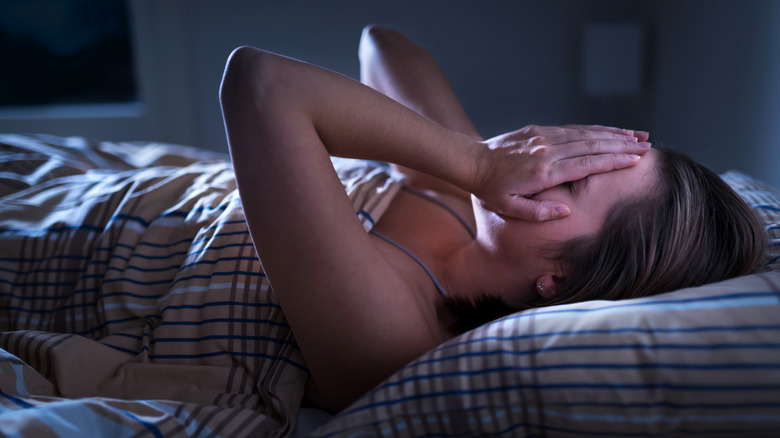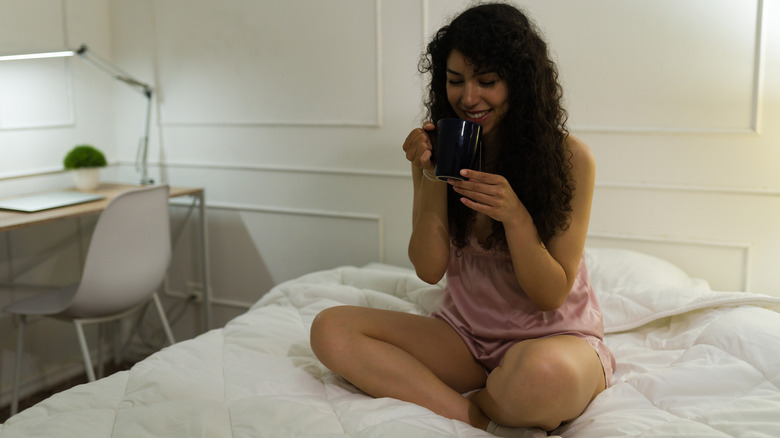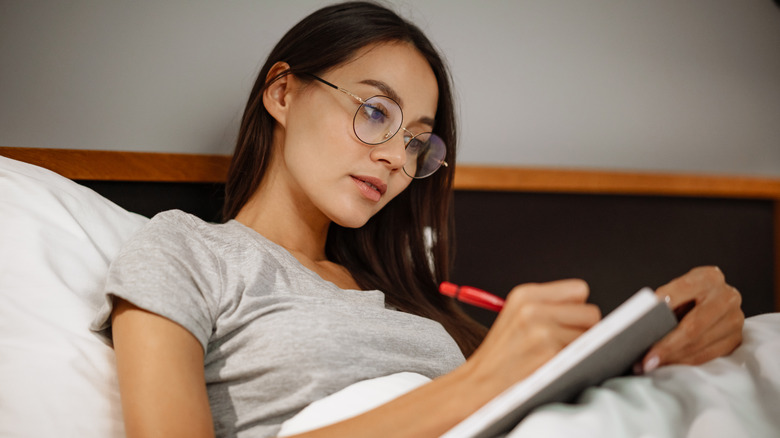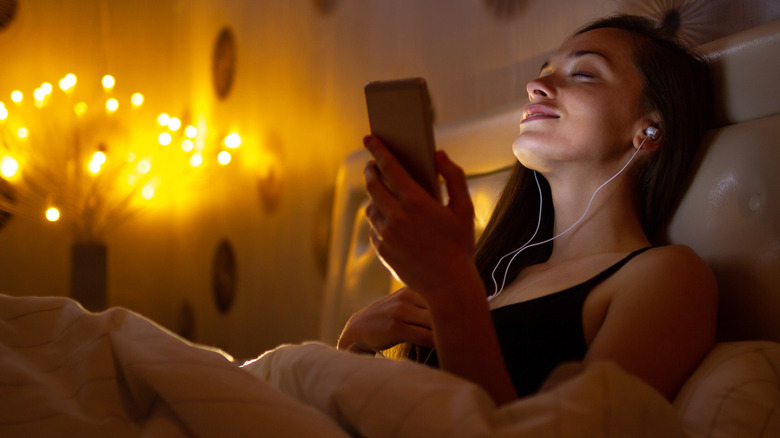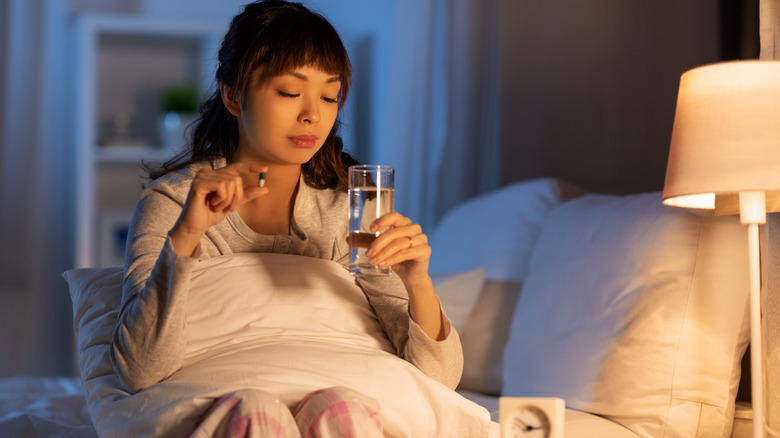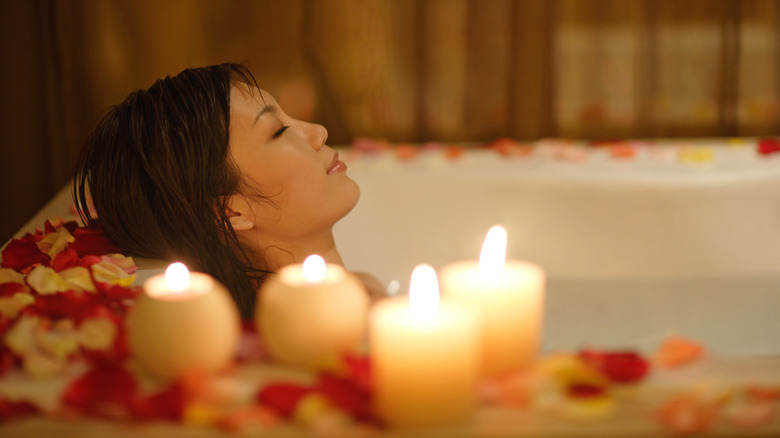How To Shed Stressors Before Bed For A Better Night's Sleep
Anxiety can be all-consuming — especially at night. When your body is exhausted but your brain is wired, it can start to feel like an impossible task to get some rest. Whether you're anxious about a project at work, a conflict in your social life, a distressing current event that's completely outside of your control, or some combination of those things, worrisome thoughts can leave you tossing and turning for hours, or even all night. And then, of course, the next day is always brutal. You're forgetting things, falling asleep at your desk, unable to concentrate on anything, and feeling miserable.
Fortunately, you do have some influence over falling asleep and the quality of your sleep. It's not always easy to make the choices that are most beneficial for our rest, but that self-discipline is incredibly worth it in the long run. A peaceful, eight-hour snooze each night can completely change your life and make you feel like a new person who's ready to take on the day and make it a fabulous one. But how can you actually get those much needed zzz's?
Start by creating a nighttime routine for yourself
It would be lovely to just snap your fingers and fall asleep after a couple of hours of binge-watching or doom-scrolling. Sadly though, those activities before bed actually make it harder to doze off; the blue light that comes from your phone and laptop interferes with your body's production of melatonin, otherwise known as the hormone that puts you to sleep. So, what else can you do at night?
Start by mapping out a regular nighttime routine that allows you to decompress and get in sync with your circadian rhythm (your natural, internal clock) instead of working against it. Choose a few of your favorite calming activities, and try going to bed at the same time every night for a week — it might just make a world of difference. If not, it's probably a good idea to seek help from a therapist who can help you manage your anxiety. What kinds of activities are best, you ask? We have some suggestions.
Journaling and meditation are great pre-bed activities
If you're aiming to avoid blue light, process your emotions in a healthy way, and help yourself feel calm and tired, meditation and journaling are both excellent practices to consider incorporating into your evening routine. In addition to aiding your sleep, both habits will also generally help you feel more peaceful and bring you some emotional clarity. Just a few minutes of meditating and journaling each night can work wonders.
Meditation sets you up for high-quality sleep by lowering your heart rate and getting you into a rhythm of deep, slow breaths. It gives you a moment just with yourself to relax your body and mind, and it's also very easily accessible; you can find guided meditation options on YouTube, streaming services, or several different apps. Journaling helps you wind down by clearing your mind of racing thoughts and transferring them to paper. You may find that after a stream-of-consciousness writing session, your feelings make more sense to you and feel less overwhelming. Try both to see what resonates with you!
Soothe yourself before closing your eyes
In addition to meditation and journaling, it's also beneficial to mix in simple, soothing habits like listening to sleep music, drinking a cup of hot tea, taking a warm bath, or lighting a nice-smelling candle while you go through your routine. When you relax each of your senses, your whole body should begin to feel more at ease and ready to drift off into sleep. Make your routine so lovely that you look forward to it each night, and it doesn't feel like a chore.
You can easily find deep sleep playlists on your streaming service of choice or YouTube, and there are a variety of sleep-friendly teas (like chamomile, lavender, or Valerian root) likely available at your local grocery store. Start by spending however long you'd like in a warm bath, and then get into your pajamas, light your favorite candle, and sip your calming tea while you enjoy mellow tunes.
You can also try sleep aids
Sleep aids can be your friends when particularly difficult or stressful nights come around, and your body just isn't settling down. Of course, it's best to make healthy before-bedtime choices and experiment with different regular practices rather than rely solely on a sleep supplement. That being said, they can work quite well for short-term use or once every so often.
Our bodies produce the melatonin hormone naturally, but during a bout of insomnia, taking a supplement can boost your own supply and help you get some rest. Another option is cannabidiol (CBD), a chemical in marijuana that does not get you high and instead helps with stress, anxiety, and pain. Though you can purchase melatonin and CBD products without a prescription, you should talk to your doctor first and make sure that's a smart course of action. You can also try a variety of other supplements like magnesium, passionflower, or Valerian root — just make sure you're always doing your research, consulting a health professional, and using aids responsibly.
Some more items that can aid your sleep journey
Sometimes, you might need a little extra help from calming products, and that's totally okay. Healthline recommends using items like an aromatherapy diffuser and essential oil set, a scented candle, or a bath bomb for a warm, relaxing bath. You may also want to invest in a subscription to a meditation app like Headspace, Calm, or Insight Timer; apps like these can help guide your meditation practice and hold you accountable by keeping you on a schedule and sending reminders.
Treat yourself! If you're going to splurge on anything, self-care is the way to go. Hopefully, by incorporating healthy habits and calming products (plus therapy if you need it), your sleep will begin to improve. It's tough but really crucial to make your hours and quality of sleep a priority. Getting enough rest means improving your mood, your immune system, your capacity to be productive, and your overall wellness.
